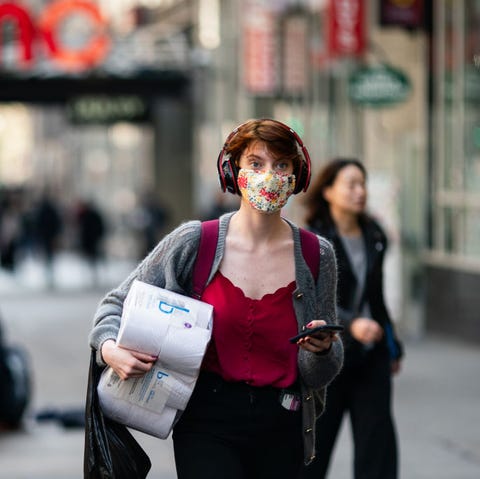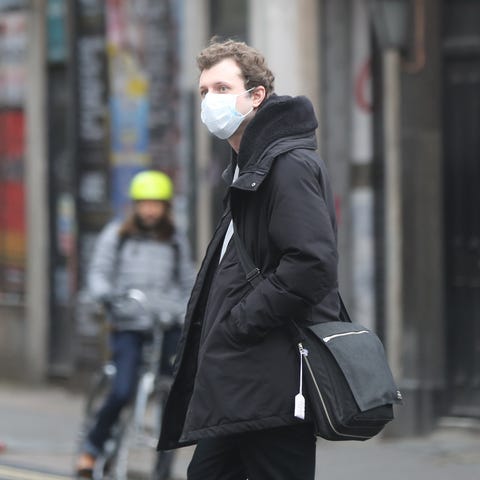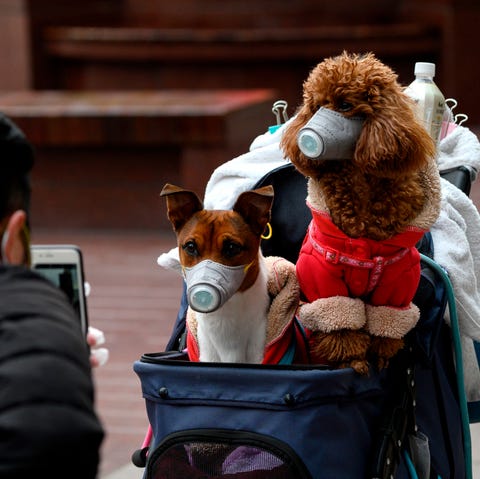Plus, six ways to keep yourself and others healthy BY EDWARD COOPER 16/03/2020

JEENAH MOONGETTY IMAGES
Let’s get one thing straight, before we go any further: you have every right to be concerned about the issue of the Coronavirus, or Covid-19. At the time of writing, there are currently 170,000 cases and 6,500 reported deaths from the disease.
Similarly, as borders close and celebrities — including Tom Hanks — go into isolation or quarantine, concern about the spreading disease has hit fever pitch, with many people being forced to work from home or practice self-isolation, for fear of catching the disease. Let’s not even talk about the toilet roll hoarding or the myths about cocaine curing the disease.
All of this, however, doesn’t mean that your health, wellbeing and mental fortitude is out of your control. Far from it, in fact — as hundreds of news and media outlets churn out headlines designed to get clicks, drive engagement and boost traffic at the cost of social anxiety, there’s never been a more pertinent time to re-calibrate yourself with cold, hard facts.
Which, hopefully, is how you’ve found yourself on this page. Here’s, we help separate the scientific fact from social media fiction on all things Coronavirus to help you stay sane and stay healthy. So, without further ado…

Coronavirus Myth #1: You Need a Face Mask
Now synonymous with the outbreak of Covid-19, the white face mask has become a symbol for a disease which has spread over several continents and can be seen being worn almost anywhere, from quiet residential streets to (unsurprisingly) crowded commuter transport. Face masks, however, aren’t a bonafide way of keeping yourself separate from the strain. The virus can transmit through your eyes and is transported through tiny particles, called aerosols, that can penetrate masks. However, for health workers and social carers dealing with the sick, face masks are an essential part of keeping both parties safe — people roaming around a city, however, will see little benefit from wearing one.
Coronavirus Myth #2: Getting Covid-19 Means Certain Death
…it certainly doesn’t. While media headlines focus on the rising death rate (let’s not forget it’s actually decreasing at its place of origin in Wuhan), there are approximately 70,000 cases of people recovering from the strain. In fact, according to the Chinese Centre for Disease Control and Prevention, 81 per cent of those infected have mild cases of the Coronavirus and only 2.3 per cent of those infected have died so far.
Crucially, this means there’s no need to panic (or to stock up on tins and dried food), but instead to use this as an opportunity to encourage healthier habits, such as washing your hands more regularly. Here’s how do it perfectly.
Coronavirus Myth #3: You Need to Be Near Someone for 10 Minutes to Contract COVID-19
This is one of the most common concerns. Generally, hospital guidelines consider ‘exposure’ distance as being up to six feet from someone coughing or sneezing for up to 10 minutes. However, shorter interactions can also lead to infection. As can contaminated surfaces, although this is a less common cause of virus transmission.

Coronavirus Myth #4: Pets Can Transmit The Disease
Keeping an eye on your four-legged friend? There’s no need. While social media erupted over the ‘WHO let the dogs out’ joke — read it here — good news came in the form of findings being published confirming that, generally, dogs and cats can’t transmit the Coronavirus to humans. That’s straight from the World Health Organization (WHO), who confirmed that companion animals show no risk of disease transmission.
Coronavirus Myth #5: COVID-19 Is Nothing Compared to the Flu
At a surface level, symptoms of the Coronavirus and the seasonal flu share a few similarities — high temperatures, sore throat and a continuous cough — but that, of course, doesn’t mean that they should be treated the same. That’s because the ‘profile’ of the Coronavirus, when compared to that of the flu, has a much graver mortality rate. Currently, this is much greater than the seasonal flu.
So, What Can I Do To Stay Healthy and Potentially Avoid Coronavirus?
We’re glad you asked. Thankfully, it won’t involve stock piling toilet paper or tearing the last remaining packets of pasta off the supermarket shelves, but instead being a little smarter about your hygiene standards and how you approach your self care — both mentally and physically.
Reconsider Your Exercise Habits
Coronavirus could be the ideal excuse to skip legs, it seems. Earlier this week, Men’s Healthpublished an article explaining how gyms and public workout areas could be a hotbed for picking up germs and, potentially, the Coronavirus. “As viruses can live on a surface outside the human body for several hours, gym equipment is a prime culprit for picking up an illness,” said Dr Ravi Tomar, a GP at Portland Medical.
“The most effective way of preventing the spread of COVID-19 in the gym, or any other virus for that matter, is for people who aren’t feeling well to simply skip their gym session and stay at home until they’re sure it’s not coronavirus.
“If you’re feeling a bit sniffly and can’t work out whether it’s spring allergies or something more sinister, use a symptom assessment app such as Doctorlink to check before you head to the gym.”
Wash Your Hands (Properly!)
This is a real no-brainer. Whether you’ve been sharing a busy office environment or grinding out reps in a commercial gym, you (and your smartphone) are almost certainly harbouring a lot of nasties. Thankfully, your body will be astute at repelling them, but as cases of the Coronavirus rise both in the United Kingdom and abroad, it’s the perfect time to mop up your habits. Here’s how to nail it every time:
- Wash your hands with soap and water often – do this for at least 20 seconds. Be sure to lather the backs of your hands, between your fingers, and under your nails
- Always wash your hands when you get home or into work, after touching rubbish, before bandaging wounds, before a meal and after using the toilet
- Use hand sanitiser gel if soap and water are not available
- Cover your mouth and nose with a tissue or your sleeve (not your hands) when you cough or sneeze
- Put used tissues in the bin straight away and wash your hands afterwards
- Try to avoid close contact with people who are unwell
Use Hand Sanitiser
Wash your hands whenever possible. Ideally, you should use an alcohol-based hand sanitiser that has at least 60 per cent alcohol.
Don’t Touch Your Face with Dirty Hands
Viruses can enter your body through your eyes, nose, mouth and other orifices. Placing contaminated hands on your face can lead to infection, so wash your hands before you touch your eyes, nose and mouth. And after using the bathroom, obviously.
Get Enough Sleep
An essential survival mechanism, sleep helps your body to recover and lowers stress. If you’re feeling ill, you should allow yourself as much sleep as your body needs.
Don’t Panic
Unless you have been in contact with someone infected with the Coronavirus, then treat any cough or cold symptoms as normal. Currently, the NHS advises that people should call 111 instead of visiting the GP’s surgery to prevent the risk of infecting others.
The information in this story is accurate as of the publication date. While we are attempting to keep our content as up-to-date as possible, the situation surrounding the coronavirus pandemic continues to develop rapidly, so it’s possible that some information and recommendations may have changed since publishing. For any concerns and latest advice, visit the World Health Organisation. If you’re in the UK, the National Health Service can also provide useful information and support, while US users can contact the Center for Disease Control and Prevention.








